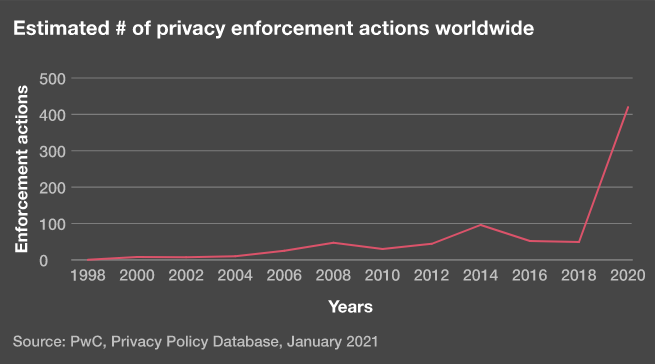Collecting internet users’ data for trading it for profit is such a big business that it is not going to die anytime soon, even though people and governments across the world are getting increasingly worried about this shady practice. EU’s GDPR and other initiatives that are being implemented are creating the necessary base rules, but protecting all valuable data is actually a bigger challenge. PwC, a global business consultancy, has discovered six megatrends that are shaping how privacy and value of data are developing until 2030.
Telling a friend, family member or a colleague how important it is to protect personal data, and not let companies like Google and Facebook suck it into their databases is often met with “Meh, who cares”. The corporate angle of the PwC report Seven privacy megatrends: A roadmap to 2030, however, points out how valuable all kind of data is, not only personal data.
Data that businesses own and manage within their computer networks is valuable, and it has to be protected. This is the key mission for cyber security operations in organizations. Data that individual users have and create is so valuable that an entire new industry, known as ad tech that trades the data, has emerged in recent years.
One of the conclusions from the privacy megatrends report is that the essence of data is the following two things that concern both individuals and businesses:
- Private and business data has value both to its owner and to other parties who may profit from it.
- In wrong hands, private and business data can and will be misused against you, your family, friends, and business.
Here is a summary of the PwC privacy megatrends 2030
The value of data continues to grow, making it an increasingly attractive target for espionage and for cybercriminals.
- Plenty of data is produced in-house but businesses also buy external data that is needed for decision making and for operations. All data must be managed carefully: “Trusted data has become more than the new oil or new currency — it’s the essential core competence”, the report states.
The emerging privacy regulation across the world will follow the European, US or Chinese model.
- The three privacy regulation models are: overall protection of citizens (EU), protection against specific harms (U.S.), and top-down control (China). At the moment large part of the world is evaluating options, for instance in South America, Africa, APAC region, and in Canada. Enterprises that market products or services globally must adapt to all models.
Authorities will exploit automated technologies to support privacy regulation.
- Artificial intelligence and automated bots are examples of technologies that may be applied for monitoring what is going on in services that consumers are accessing.

Privacy paradox is alive and well until an innovation breaks the current model.
- An average internet user regards his or her privacy valuable, but when a social media service wants all their personal data, they happily hand it over. This privacy paradox is a result of lack of understanding what is involved, thrill of free services, and forgetting the risks of leaking data to wrong hands. Nonetheless, privacy awareness among consumers is growing, and the moment will come when a business introduces the right value proposition to consumers. A value proposition that regards data as a currency that consumers own and can trade.
Trusted technology standards will emerge.
- New technologies, like driverless cars or robots have a great long term potential, but valid questions are, for instance, when are they suitable for mass markets, and how do the vendors manage users’ private data? Here, megatrends report has discovered an opportunity for vendors that set high technology standards for products and services that respect customers’ safety and privacy.
Global talent shortage for cybersecurity and privacy professionals persists.
- New trusted technology and data ethics standards should be designed into all business operations. The standards have to be robust enough to stand up to continual inspection by external stakeholders. This requires professionals who master security, privacy and data management, but global shortage for experts is not going away any time soon.
All data is valuable, not only private and confidential data. The Wild West of tracking people and making billions of dollars with the data is coming to an end. As the megatrends report predicts, we are optimistic that supported by regulation, one day an enterprise finds the right balance between private data, owners of the data, and making business with it.
